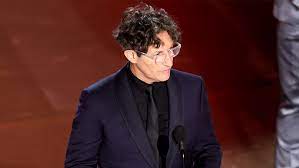Jonathan Glazer is a renowned filmmaker known for his work on movies like “Sexy Beast,” “Birth,” and “Under the Skin.” However, it wasn’t until he delivered a groundbreaking Oscars speech that he truly made an impact on the film industry. Glazer’s speech at the Oscars was a bold and controversial move, which sparked a flurry of debate and discussion within the film community.
In order to understand the significance of Glazer’s Oscars speech, it is important to first consider the historical context in which it took place. The Oscars, also known as the Academy Awards, are one of the most prestigious awards ceremonies in the film industry. Winning an Oscar is considered the pinnacle of achievement for any filmmaker or actor, as it signifies recognition from their peers and the industry at large.
Glazer’s speech took place during the 90th Academy Awards ceremony, where he won the award for Best Director for his film “Under the Skin.” His speech was unexpected and unconventional, as he used the platform to call out the lack of diversity and inclusion in Hollywood. Glazer criticized the industry for its failure to accurately represent marginalized communities and for perpetuating stereotypes and discrimination.
By using his acceptance speech to address such important issues, Glazer instantly became a figurehead for social justice within the film industry. His words resonated with many who had long been calling for more diversity and representation in Hollywood. Glazer’s speech sparked a wave of discussion and reflection within the industry, leading to renewed efforts to address systemic issues of inequality and discrimination.
However, not everyone was supportive of Glazer’s speech. Some critics accused him of grandstanding and using the Oscars as a platform for his own agenda. Others argued that his comments were out of place and inappropriate for an awards ceremony. Despite these criticisms, Glazer’s speech had a lasting impact on the film industry, prompting important conversations and actions towards greater diversity and inclusivity.
In addition to Glazer’s own contributions, there have been many other influential individuals who have contributed to the field of social justice and representation in film. Directors like Ava DuVernay, Barry Jenkins, and Dee Rees have all made significant strides in promoting diverse stories and perspectives on screen. Actors like Viola Davis, Mahershala Ali, and Lupita Nyong’o have also used their platforms to advocate for greater inclusivity in Hollywood.
Overall, Glazer’s Oscars speech was a groundbreaking moment that highlighted the need for greater diversity and representation in the film industry. While it may have been met with mixed reactions, there is no denying the impact it had on sparking important conversations and actions towards a more inclusive and equitable industry. As the film industry continues to evolve, it is important to remember the lessons learned from Glazer’s speech and strive towards a more diverse and representative future.



